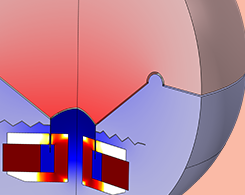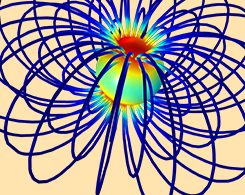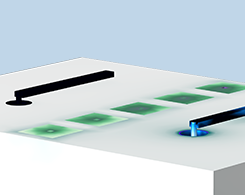Electromagnetics Blog Posts

Modeling a MOS Capacitor with the Semiconductor Module
MOS capacitors (MOSCAPs) contain 3 main parts: a semiconductor body or substrate, an insulator film, and a metal electrode (or gate). You can use the Semiconductor Module to model MOSCAP designs.

How to Perform a Nonlinear Distortion Analysis of a Loudspeaker Driver
For a thorough and complete analysis of a loudspeaker driver design, acoustics engineers need to perform nonlinear time-domain studies in addition to frequency-domain studies.

Optimizing Combustion Particle Control in an Electric Filter Design
To optimize the design of an electrostatic filter, researchers from Switzerland used multiphysics modeling, validating their results by comparing them to experimental data.

Studying the Van Allen Belts with Particle Tracing Simulation
Get a closer view of the Van Allen belts, 2 donut-shaped belts of radiation that surround Earth, with the help of particle tracing software.

How to Model Conductors in Time-Varying Magnetic Fields
You can use the AC/DC Module to perform frequency-domain simulations for conductors in time-varying magnetic fields by describing the skin effect.

Analyzing Magnetotellurics with Electromagnetics Simulation
Magnetotellurics (MT) is a geophysical method for mapping the magma flow of volcanos. Using electromagnetics simulation, engineers are able to study and improve this technique.

Studying the Decoupling Effect of Electromagnetic Band Gap Structures
Electromagnetic band gaps (EBGs) can suppress unwanted EMI and increase desired EMC between antennas, improving their performance. Learn how to study this decoupling effect via simulation.

Chasing Waves: The Story of John Scott Russell and the KdV Equation
It all started with a horse: Learn about the history and use cases for solitons, as well as the life and work of the naval architect behind the KdV equation: John Scott Russell.
